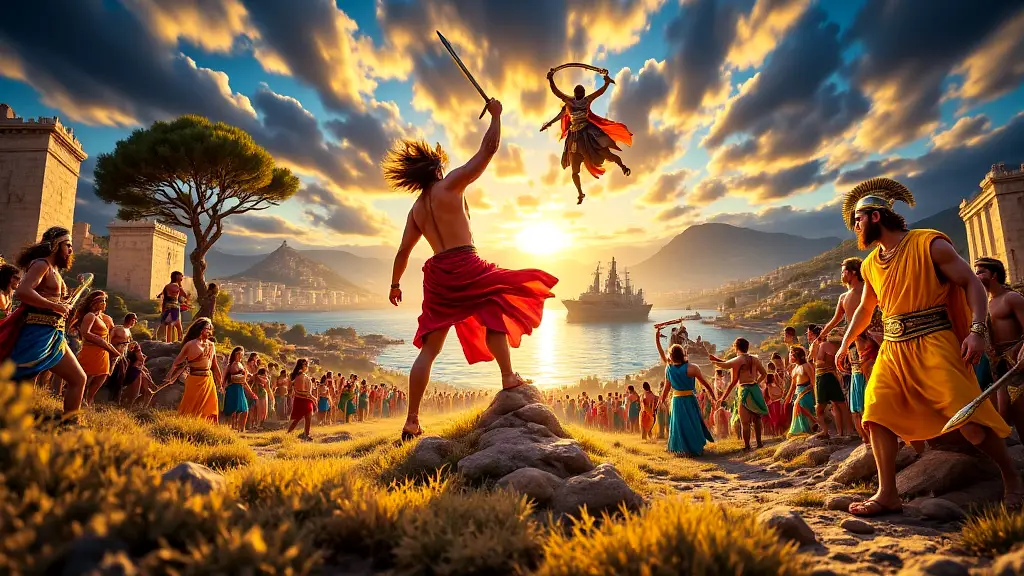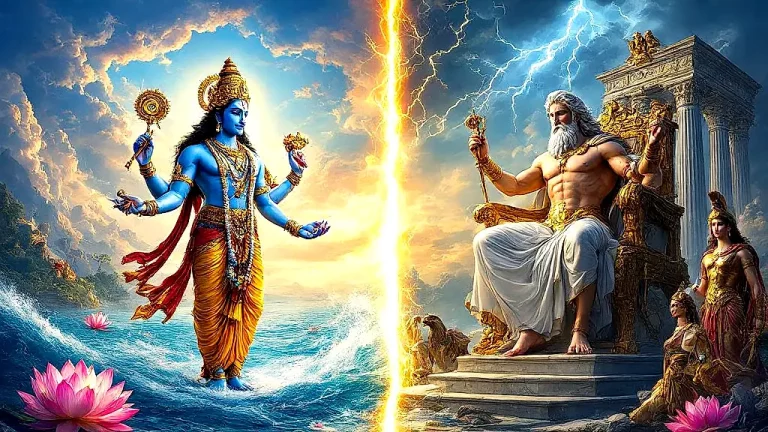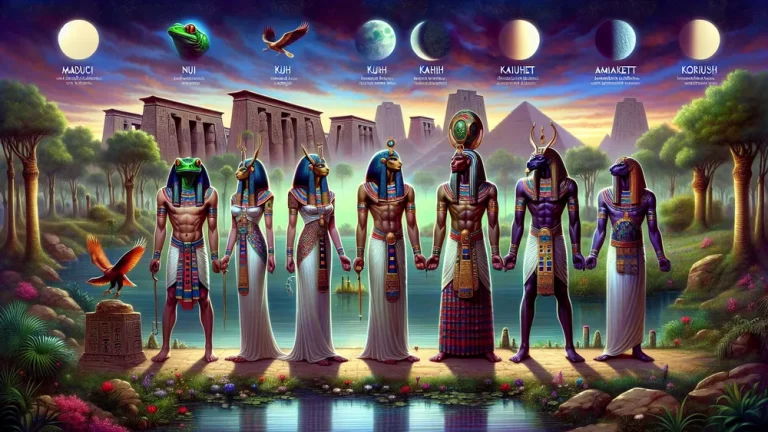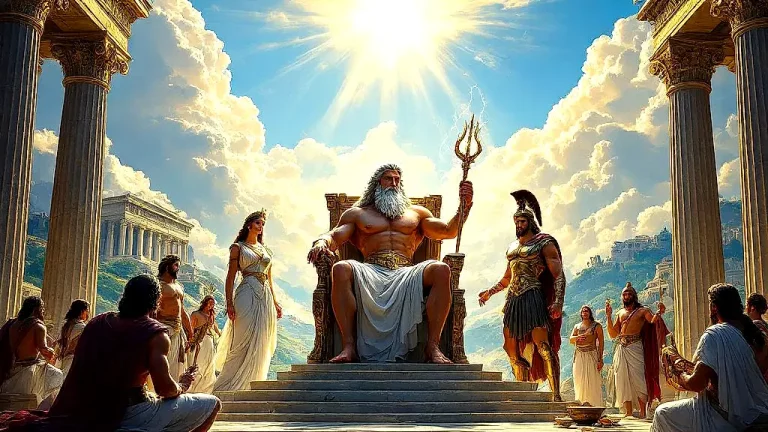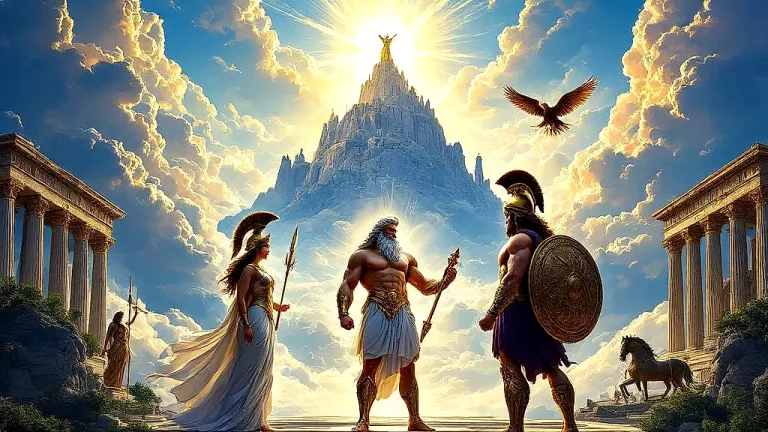Famous Greek Heroes In Mythology And Their Legendary Deeds
Picture a world where humans fought lions, tricked gods, and survived curses as brutal as their victories. That’s Greek hero myths for you. These stories weren’t just adventures. They shaped Greek culture by mixing history, religion, and lessons about right and wrong. Heroes like Heracles and Achilles weren’t only strong. They were demigods – children of gods and humans – who showed courage, cleverness, and sometimes terrible mistakes.
Key Points:
- Greek heroes were often half-god, half-human, with great strength or cleverness but also big flaws like anger or pride.
- Gods helped or cursed heroes—Athena gave Perseus tools to kill Medusa, while Hera made Heracles suffer for being Zeus‘ son.
- Heracles did twelve impossible tasks, from killing monsters to stealing golden apples, to make up for a crime he didn’t mean to commit.
- Theseus beat the Minotaur in a maze using a thread from Ariadne, proving brains could win where just strength might fail.
- Achilles’ rage and skill decided battles in Troy, but his weak heel led to his death, while Odysseus tricked the Trojans with a wooden horse.
- Heroes often fell because of too much pride—Ajax lost his mind, Bellerophon fell from the sky, and Icarus flew too close to the sun.
- After death, some heroes became gods, like Heracles, while others were worshipped at their tombs, mixing human fame with divine power.
They were like early versions of superheroes. Heracles’ labors match the Hulk’s power, while Odysseus’ plans are as sharp as Batman’s tools. But their tales weren’t simple. Different versions exist. Was Medusa always a monster, or did Athena curse her? Did Perseus use winged sandals or a god’s chariot? These differences prove how myths changed over time and place.
As we look at their feats – killing Gorgons, escaping mazes – you’ll see how these heroes stood between gods and humans. Their impact lasted in temples, festivals, and even today’s stories. Want to dig into fate, gods, and epic battles? Let’s go.
Greek Heroes In Mythology: Overview and Key Facts
| Aspect | Key Facts | Examples and Notes |
|---|---|---|
| Definition | Heroes were either mortals or demigods – half-god, half-human – known for incredible feats, often linked to gods or curses. | Heracles was Zeus’ son, while Achilles’ mother was the nymph Thetis. Some, like Odysseus, had no divine blood but still got help from gods like Athena. |
| Core Traits | 1. Divine connection (parentage or favor from gods like Zeus).<br>2. Exceptional abilities, like strength or cleverness.<br>3. Tragic flaws, such as arrogance or rashness.<br>4. They chased kleos, meaning eternal fame. | Achilles was unmatched in battle but let rage destroy him. Bellerophon’s hubris made him demand to ride Pegasus to Olympus. |
| Godly Influence | Gods could be allies or enemies. Athena helped Perseus with a mirrored shield, while Hera drove Heracles to madness. | Medusa’s origin varies: some say she was born a monster, others claim Athena cursed her. |
| Cultural Role | Heroes linked gods and humans. Their graves became worship sites, and cities tied their identity to them. | Thebes held games for Heracles, and Sparta saw Achilles as the ideal warrior. Athens credited Theseus as its founder. |
Understanding Greek Heroes in Mythology
To really understand these heroes, we need to look at what made them special. This includes their divine gifts and their fatal flaws.
What Made a Greek Hero Special?
Greek heroes weren’t just strong fighters. They stood somewhere between gods and humans, with remarkable powers but also human weaknesses. You might compare them to modern superheroes, but they had particular traits that defined Greek heroes. Their special status usually included:
- Divine connection: Most were demigods (like Heracles, Zeus’s son) or had gods helping them (Odysseus with Athena). Even supposedly mortal heroes like Theseus might have had divine ancestors.
- Exceptional abilities: This meant more than strength (Heracles’ labors). It included clever plans (Odysseus’ Trojan Horse) or magical items (Perseus’ winged sandals).
- Serious flaws: Their best trait usually had a downside – like Achilles’ weak heel or Bellerophon’s hubris when he flew too close to Olympus.
- Typical roles: They served specific purposes as monster-killers (Perseus), city-starters (Theseus), or elite fighters (Achilles).
Even the best heroes didn’t have all these traits equally. What they shared was how these qualities shaped their famous tales.
Greek heroes were part god and part human, with amazing powers but also big flaws that made their stories exciting.
How Gods Helped (or Cursed) Heroes
The Olympian gods often controlled heroes’ lives by giving powerful help when they wanted. Athena acted as Odysseus’ divine strategist, suggesting escape plans during the Trojan War and guiding him home. She served as his powerful divine helper. Hermes gave Perseus special equipment like winged sandals for his fight against Medusa.
Even lesser gods helped too – the sea nymph Thetis got Hephaestus to make godly armor for Achilles, which made him almost unbeatable. The gods had reasons for helping, usually connected to their own conflicts, like Athena and Poseidon disagreeing about Odysseus’ journey. However, the gods’ attention could also bring trouble.
Hera’s relentless harassment of Heracles forced him to kill his family and complete impossible labors, all because she hated Zeus’ son. Apollo punished Cassandra with prophetic visions nobody believed after she refused him. Even helpful gods could change their minds – Dionysus helped Theseus in the Labyrinth but later made him leave Ariadne.
According to some stories, these punishments served as divine justice, while others say the gods were just using mortals in their fights.
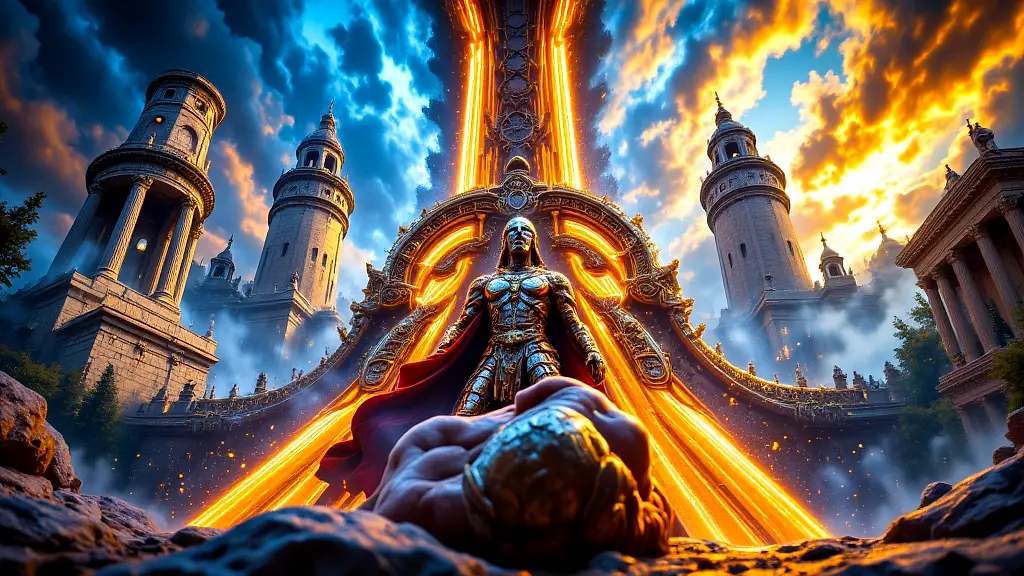
How Heroic Traits Shaped Their Stories
The Greek heroes’ main qualities didn’t just make them interesting – they drove their stories forward. Perseus’ divine gifts, including Athena’s mirrored shield and Hermes’ winged sandals, did more than just keep him alive. They let him complete the impossible task of cutting off Medusa’s head without looking directly at her. Achilles had superhuman fighting skills that made him crucial at Troy, but his human anger caused problems too.
When he left the battle because his honor was insulted, this led to Patroclus’ death and forced his own tragic return to war. Odysseus’ famous cleverness had both benefits and problems. His Trojan Horse plan won the war, but it also made Poseidon angry. Because of this, his journey home took ten years and tested his character completely. These myths show us how Greek stories balanced amazing abilities with normal human weaknesses.
The heroes’ greatest strengths often led directly to their biggest challenges.
Famous Greek Heroes and Their Adventures
Let’s look at how these heroic qualities appeared in Greece’s most famous myths. In these stories, we see the heroes doing both incredible and very human things.
Heracles: The Twelve Labors
Heracles was born to Zeus and the mortal Alcmene, which made Hera furious. When he was just a baby, she sent snakes to kill him, but he strangled them with his bare hands. Hera’s anger peaked when she drove Heracles mad, making him kill his own family.
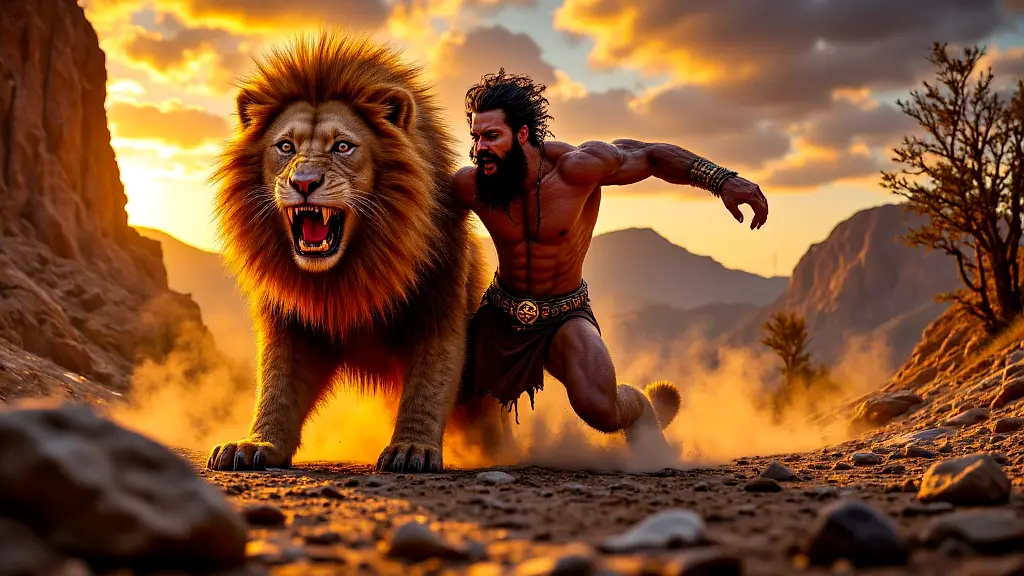
To make up for this, the Delphic oracle ordered him to serve King Eurystheus for twelve years and complete any tasks the king gave him. What started as punishment became the greatest challenge for a hero, with Eurystheus following Hera’s orders to create harder and harder tasks. The Twelve Labors were an organized series that moved from local dangers to huge, mythical challenges.
First came labors like killing the Nemean Lion and Lernaean Hydra, which removed monsters from the Peloponnese. Later tasks took Heracles to distant, legendary places – like getting golden apples from Hera’s garden at the edge of the world, or going down to the Underworld. Some stories say Eurystheus originally gave ten labors, but didn’t count two because of technicalities, so Heracles had to do two more.
Each labor had deeper meaning, showing how humans fight against chaos, death, and the gods.
Among the most famous labors were:
- Killing the Nemean Lion (Heracles wore its unbreakable hide as armor)
- Defeating the nine-headed Hydra (his nephew Iolaus helped by burning its necks closed)
- Catching the golden-horned Ceryneian Hind (which belonged to Artemis)
- Cleaning the Augean stables in one day (he did this by redirecting rivers)
- Bringing Cerberus up from the Underworld (the only labor where Heracles used no weapons)
The later labors became even more incredible – taking the belt from Amazon queen Hippolyta, or holding the sky while Atlas got the Hesperides‘ apples. Through all twelve, Heracles showed not just strength but cleverness, amazing endurance, and how complicated relationships between heroes and gods could be.
Perseus and the Gorgon’s Head
Perseus got help from the gods for his impossible task. Athena gave him a polished bronze shield because looking directly at Medusa would turn him to stone. Hermes provided winged sandals for flying, and nymphs gave him Hades‘ helmet of invisibility plus a magic bag.
But these gifts weren’t sufficient by themselves – Perseus first tricked the Graeae, three old sisters who shared one eye, into telling him where Medusa lived. This shows how Greek heroes mixed divine help with human cleverness. Each god’s gift helped defeat Medusa in a specific way. The shield worked as a mirror, the sandals let him escape quickly, and the helmet made him invisible.
When Perseus attacked, he flew into the Gorgons’ cave backward while using the shield’s reflection to move safely. He cut off Medusa’s head while she slept, a scene shown in many ancient vase paintings that display his tense, twisted body. From her neck came Pegasus the winged horse and Chrysaor, while Medusa’s sisters chased after Perseus until he disappeared using the helmet. Later, Perseus used Medusa’s head as a weapon.
He turned Atlas into a mountain and made the sea monster Cetus become stone. Finally, he gave the head to Athena for her aegis (a special shield). This single victory affected many other stories – even Medusa’s blood drops became Libya’s poisonous snakes. One hero’s success could change the entire world of Greek myths.
Theseus: Beating the Minotaur
Theseus chose to be one of Athens’ sacrificial offerings to Crete, where King Minos fed people to the Minotaur – a half-man, half-bull monster that came from Queen Pasiphae’s unusual mating with a sacred bull. The creature lived in Daedalus‘ labyrinth, an impossible-to-escape maze under Knossos palace where victims got lost until the Minotaur found them.
Different stories tell us whether Theseus was picked randomly or volunteered bravely, but all agree he sailed on ships with black sails, which later became important. This wasn’t just about personal fame – it challenged Crete’s power over Athens, turning a sacrificial offering into an act of defiance. Inside the maze, Theseus won through both planning and chance.
Princess Ariadne, either because she loved him or wanted to oppose her father, gave him the famous thread and a sword. Some versions say she also gave him a crown that lit up the dark. Different versions describe the fight differently – some say it was a long struggle, others that Theseus ambushed the Minotaur in the twisting passages.
After killing the beast, he followed the thread back out, though he almost forgot to change the ship’s sails from black to white, which made his father Aegeus kill himself. The myth has multiple endings because it mattered so much to Greek culture – was Ariadne left behind on Naxos or made a god by Dionysus? Was the Minotaur really named Asterion?
These different versions show how one hero’s actions became the foundation story for many cities.
Theseus killed the Minotaur in Crete’s maze to free Athens from King Minos’ cruel rule, using Ariadne’s thread to escape but forgetting to change his ship’s sails, causing his father’s death.
Great Battles and Quests: The Trojan War and Beyond
Single heroes had their own challenges, but Greek myths also featured famous group battles. The Trojan War and the quest for the Golden Fleece show these major conflicts when gods and humans fought together. These events gathered many heroes in struggles that shaped Greek mythology.
The Trojan War: Achilles’ Fury and Odysseus’ Tricks
Achilles’ wrath – the first word of Homer’s Iliad – caused the war’s worst moments. When Agamemnon took Achilles’ war prize Briseis, the greatest Greek warrior stopped fighting completely. This god-like anger had terrible results: without their best fighter, the Greeks kept losing battles until Patroclus died. Patroclus wore Achilles’ armor when Hector killed him with a spear.
Ancient sources disagree if Patroclus was Achilles’ cousin, lover, or both, but all say his death made Achilles return to battle. Achilles now fought because he grieved, not just from pride. His fight with Hector before Troy’s walls remains one of history’s most brutal duels, complete with dragged bodies and broken xenia (guest-friendship rules).
While Achilles showed pure fighting skill, Odysseus was known for clever strategies. His most famous plan, the Trojan Horse, took advantage of Trojan beliefs. After pretending to leave, the Greeks left a “gift” that hid elite warriors inside. Earlier, Odysseus had proved his skill during the Doloneia night raid when he stole Trojan battle plans.
Some stories say he pretended to be insane to avoid joining the war, and later created the oath that forced Helen’s suitors to protect her marriage. These stories show Odysseus to be the ancient world’s expert in trickery, surprise attacks, and unconventional warfare. The war’s end brought both men’s stories together tragically.
Achilles died when Paris shot him in the vulnerable heel (with Apollo’s help). Meanwhile, Odysseus’ wooden horse succeeded where ten years of fighting had failed. Later stories added more details: Achilles’ ghost demanded a sacrifice, and Odysseus began his long journey home. The Trojan War became the perfect example of Greek values: honor against cleverness, personal fame against group victory, and how gods’ favor could bring humans terrible costs.
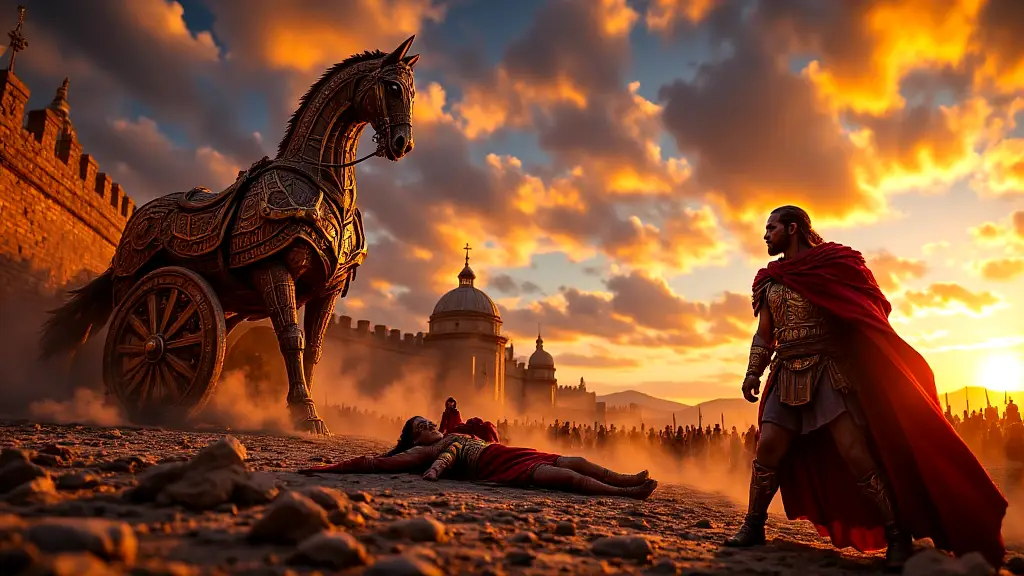
Jason and the Argonauts: Hunting the Golden Fleece
Jason’s hunt for the Golden Fleece started because he needed to reclaim his stolen throne from Pelias, who had stolen his throne. Pelias gave Jason this impossible task because he knew the Fleece was in faraway Colchis, where a dragon always watched it. This wasn’t just any animal skin – it came from a golden ram that saved Phrixus (whose sister Helle drowned in the Hellespont).
The ram was later sacrificed to Ares and hung in his sacred grove. Different stories argue whether this was a test from the gods or just politics, but all agree Jason gathered Greece’s best heroes for the Argo’s crew, including Heracles, Orpheus, and Atalanta, each with special skills.
The journey faced classic adventure challenges:
- Clashing Rocks (Symplegades): Moving stone gates that only opened when a dove flew through at the right moment
- Harpies: Flying creatures that tortured people until the Boreads chased them away
- Talus: A bronze giant (automaton) that Medea’s magic or Poeas’ arrow defeated
- Sown Men: Warriors grown from dragon teeth that Jason tricked into fighting each other
Medea, a Colchian princess and priestess of Hecate, became key to Jason’s success. She helped with magic, showing the story’s moral gray areas. Medea helped Jason control fire-breathing bulls, deal with the dragon-teeth warriors, and put the guardian dragon to sleep – though some say Athena helped directly.
When they fled with the Fleece, Medea cut up her brother Absyrtus to slow their pursuers, starting a series of terrible events that continued in Corinth. The Argonautica stands out among Greek myths because it shows a shining prize won through courage, help from gods, and questionable decisions.
How Heroes Met Their End
Greek heroes did amazing things, but their stories often ended in just as dramatic deaths. Their deaths show us the complicated ideas Greeks had about dying, divine justice, and what fame costs.
When Pride Led to Fall
Greek mythology shows how hubris (excessive pride) leads to punishment from the gods. Take Ajax the Great, the second-best warrior after Achilles, who killed himself with his sword when Odysseus got Achilles’ armor instead of him. This wasn’t just about disappointment – ancient sources say Athena made him lose his mind because he had disrespected her before.

Similarly, Bellerophon rode Pegasus and defeated the Chimera, but when he tried to fly to Mount Olympus, Zeus sent a horsefly that stung Pegasus. Bellerophon fell back to earth and spent his life as a crippled wanderer. These stories served as warnings about how human success could anger the gods if it went too far.
The most famous example is Icarus, whose wings melted because he flew too close to the sun against his father’s warnings. Some versions say this punished his father Daedalus for building the Labyrinth, while others blame Icarus’ youthful carelessness. All versions agree about his final moments – the wax failed, and he fell into the sea that now carries his name.
Together, these myths show the Greek belief that the gods protected the natural order by punishing those who overstepped their limits, whether through military pride like Ajax, divine ambition like Bellerophon, or simple disobedience like Icarus.
Heracles’ Final Moments and Rise to Godhood
Heracles suffered his last painful experience when his wife Deianeira gave him a poisoned robe. The centaur Nessus had tricked her into thinking it was a love potion, but it actually contained poison from the Hydra’s blood, which burned through his skin with extreme pain. When he couldn’t bear it any longer, Heracles built his own funeral pyre on Mount Oeta.
The flames burned away his mortal body while Zeus sent a thundercloud to take his divine part to Olympus. There, Heracles became the first mortal to achieve full godhood. He made peace with Hera, his lifelong enemy, who then welcomed him as family by having him marry Hebe, the goddess of youth. This completed his change from a suffering hero to an immortal deity worshipped across the ancient world.
Heracles became a god after his poisoned robe made him burn his mortal body away, then Zeus took him to Olympus where he made peace with Hera and married the goddess of youth.
Oedipus: The Hero Who Knew Too Much
Oedipus first showed his cleverness by solving the Sphinx’s riddle: “What walks on four legs at dawn, two at noon, and three at twilight?” His answer (“Man”) saved Thebes and won him the throne. This showed the smart thinking Greeks admired as much as physical strength, and he became king while marrying Queen Jocasta.
But this success led directly to his ruin, because he had unknowingly already fulfilled part of Delphi’s prophecy – he killed his father Laius during a roadside fight when they met by chance. When a plague struck Thebes, Oedipus investigated and discovered the terrible truth. The man he killed in self-defense was his father, and his wife was his mother.
Ancient sources disagree about whether Jocasta killed herself before or after Oedipus blinded himself with her jewelry, but all agree this knowledge changed Oedipus from a hero to a homeless wanderer. Other heroes died fighting monsters or angering gods, but Oedipus was destroyed by his own intelligence.
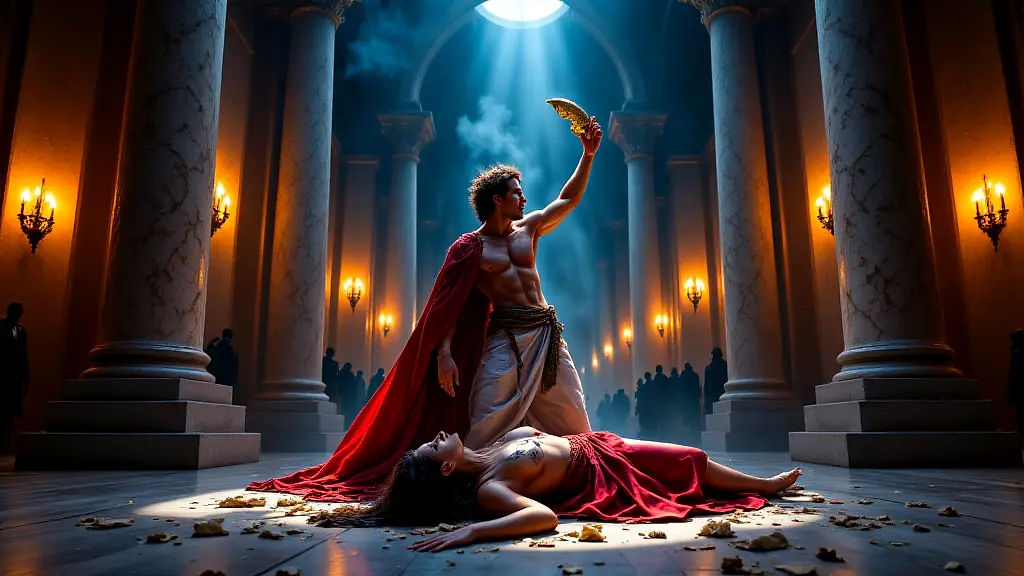
The Greeks saw this as the clearest proof that humans can never fully understand the gods’ plans.
How Greek Heroes Live On
Greek heroes found another way to live on after their deaths. People still honor them in temples, depict them in artworks, and tell their stories today. These tales outlasted their deaths and went on to influence many other cultures beyond ancient Greece.
Hero Worship in Ancient Times
The ancient Greeks built special shrines called heroa where they worshipped heroes. People left offerings of food, wine, and animals to gain their favor. While Olympian gods had temples, heroes were honored at their tombs or death sites because Greeks believed they kept their power after death – similar to saints in later religions.
Archaeologists have found these shrines containing everything from simple pots to evidence of sports competitions, which proves heroes were seen as part human, part divine. Some major hero cult centers included:
- Heracles: Worshipped as both god and hero at over 30 sites, including Thebes where he was born
- Achilles: Had an important burial shrine at Troy that attracted visitors for centuries
- Theseus: Athens honored him with the Theseia festival featuring athletic games
- Oedipus: People worshipped him in Colonus where he vanished, believing he protected Athens
Cities often fought to own heroic relics. Athens proudly claimed Theseus’ bones, while Sparta protected Orestes’ tomb. These powerful sacred objects were thought to guarantee victory in war. Hero cults were used for both religion and politics, with heroes acting as protectors for their cities.
Greek Heroes vs. Other Myths
Greek heroes differ from other mythologies because of their very human qualities. Where Norse stories honor warriors who accept they will die in battle, Greek heroes like Achilles and Oedipus fight against their destinies with normal human emotions. Egyptian heroes were gods, and Mesopotamian figures like Gilgamesh tried to live forever, but Greek heroes existed somewhere between gods and mortals.
Their stories often serve as warnings about pride as much as celebrations of strength.
| Feature | Greek Heroes | Norse Heroes | Egyptian Heroes |
|---|---|---|---|
| Parentage | Often half-divine (Heracles) | Usually mortal (Sigurd) | Typically gods (Horus) |
| Flaws | Tragic flaws (Achilles’ anger) | Few personal flaws | Perfect as gods |
| Fate | Fight against prophecy | Accept Ragnarök | Keep the universe balanced |
| Afterlife | Might become gods after death | Go to Valhalla | Get reborn as gods |
| Purpose | Teach moral lessons | Gain battle glory | Support god-kings |
The Greek focus on heroic flaws shows their cultural values. Norse myths prepared warriors for war, and Egyptian stories supported the idea of god-kings, but Greek hero tales examined human nature. Many cultures have monster-slaying heroes, but the Greek versions always return to human questions about choice, duty, and how much power mortals really have.
Hercules: How Rome Adopted a Greek Hero
The Greek hero Heracles changed in important ways when Rome adopted him as Hercules. By the 2nd century BCE, he had risen to become one of Rome’s most popular gods. While Romans kept his famous tasks and divine father, they focused on different parts of his story.
Greeks emphasized his human mistakes and eventual becoming a god after death, but Romans celebrated him as a hero who made lands safe by defeating monsters in Italy. Virgil’s Aeneid even connected Hercules to Rome’s founding myths. Archaeologists have found proof that Hercules became part of daily Roman life. At the Ara Maxima, Rome’s oldest altar, merchants gave offerings for good luck in business.
Emperor Commodus had a well-known connection with the hero. These examples show how Rome completely changed this Greek hero to fit its own needs and beliefs.
FAQs
1. Were Greek heroes considered gods?
Greek heroes were typically demigods, though some like Heracles achieved full godhood after death.
2. Who was the most tragic Greek hero?
The most tragic Greek hero was Oedipus, doomed by fate to unknowingly kill his father and marry his mother.
3. Did female Greek heroes exist?
Female Greek heroes did exist, such as the huntress Atalanta and the Amazon queen Penthesilea.
4. What’s the most famous heroic deed?
The most famous heroic deed in Greek mythology is Heracles’ completion of the Twelve Labors, a series of impossible tasks punishing him for his tragic madness.

